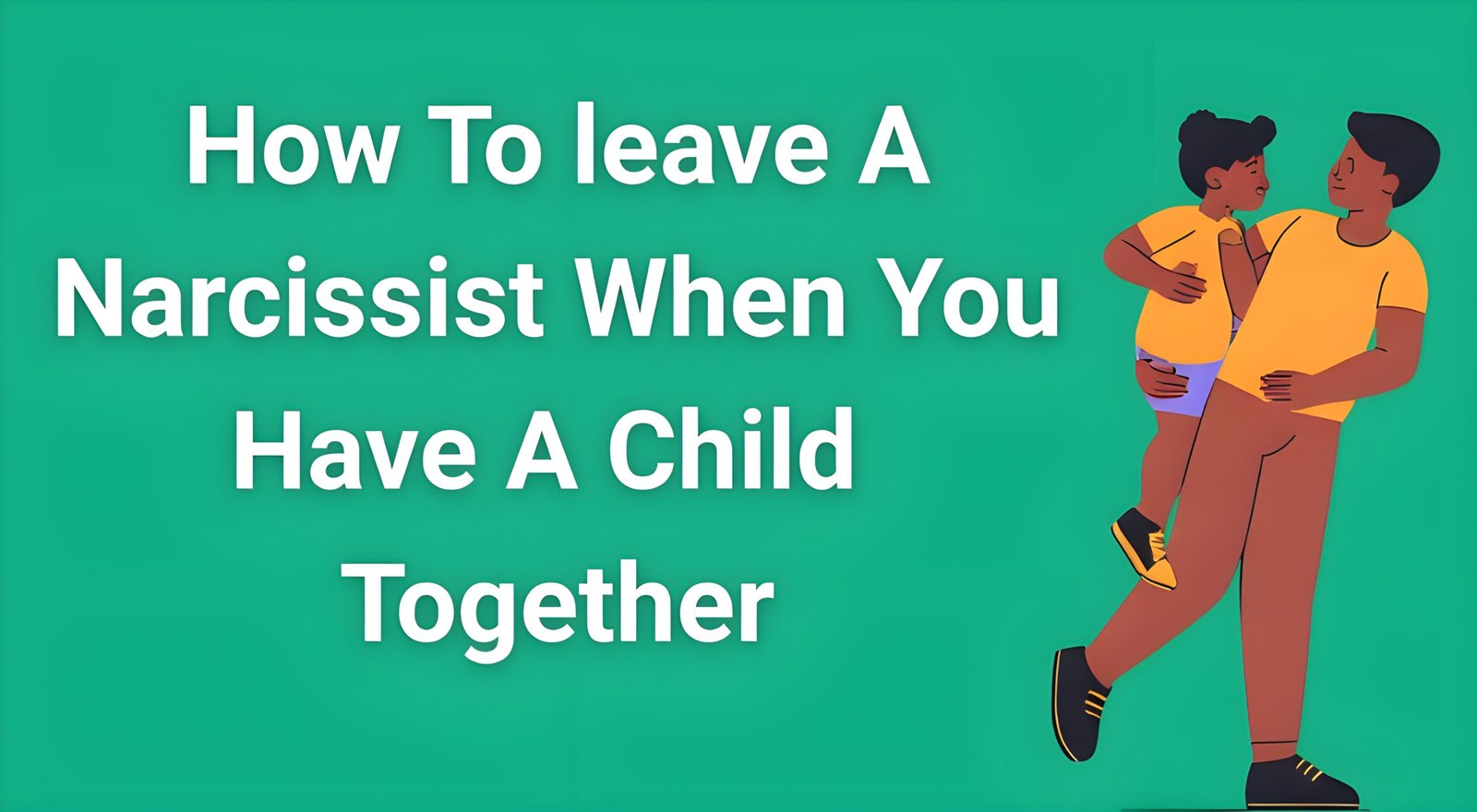The question “How to leave a narcissist when you have a child together” represents one of the most heart-wrenching dilemmas a parent can face. You’re not just ending a toxic relationship – you’re navigating the complex reality of shared custody, protecting your child’s emotional well-being, and breaking free from someone who will use your most precious relationship as a weapon against you.
- Understanding Why Leaving a Narcissist with Children Is So Complicated
- Phase 1: Recognizing the Reality and Planning Your Exit
- Phase 2: Legal Protection and Child Safety Strategies
- Phase 3: Breaking the Trauma Bond While Protecting Your Child
- Phase 4: Long-Term Healing and Building Your New Life
- Protecting Your Child From Long-Term Emotional Damage
- Frequently Asked Questions
- Conclusion: Your Journey to Freedom Starts With One Brave Decision
If you’re reading this at 3 AM, questioning your sanity and wondering if you can actually escape, know this: You’re not crazy, you’re not alone, and yes, you can leave safely with your child protected. The path isn’t easy, but thousands of parents have successfully navigated this treacherous journey to create healthy, peaceful lives for themselves and their children.
Understanding Why Leaving a Narcissist with Children Is So Complicated
When you share a child with a narcissistic partner, leaving becomes exponentially more complex than a typical breakup or divorce. Unlike other toxic relationships where you can implement complete “no contact,” having children creates an unavoidable lifelong connection that narcissists exploit ruthlessly.
The Unique Challenges You Face:
Narcissistic partners use children as their most powerful manipulation tool. They understand that your protective instincts and love for your child create vulnerabilities they can leverage. This might manifest as threats to seek full custody, promises to “destroy” you in court, or weaponizing your child’s emotions against you.
The trauma bonding that keeps you tied to your narcissistic partner becomes even stronger when children are involved. Your brain releases powerful chemicals designed to keep families together, making the decision to leave feel like you’re literally fighting your own biology.
Children complicate the logistics of leaving significantly. You can’t simply pack a bag and disappear – you need careful planning around custody arrangements, legal protections, and ensuring your child’s stability throughout the transition.
Phase 1: Recognizing the Reality and Planning Your Exit
Accepting That Co-Parenting With a Narcissist Is Impossible
Before you can successfully leave a narcissist when you have a child together, you must abandon the fantasy of healthy co-parenting. True co-parenting requires empathy, compromise, and putting the child’s needs first – traits fundamentally absent in narcissistic personality disorder.
Instead, you’ll be engaging in “parallel parenting,” where you parent your child independently without expecting cooperation, consistency, or consideration from your narcissistic ex-partner. This mindset shift is crucial for your mental health and realistic planning.
Creating Your Secret Safety Plan
Your exit strategy must remain completely confidential. Narcissists are master manipulators who excel at sabotaging escape plans, so operational security is paramount.
Essential Documentation to Gather Secretly:
Start collecting and securing copies of all vital documents. Your child’s birth certificate, social security card, medical records, and school information should be photographed and stored securely outside your home. Include your own identification documents, financial records, and any evidence of abuse or manipulation.
Create a financial escape fund in a separate account your partner cannot access. Even small amounts saved consistently can provide the resources needed for emergency housing, legal fees, or basic necessities during your transition.
Establishing Your Support Network:
Identify trusted family members or friends who can provide practical and emotional support. This network should include people your narcissistic partner doesn’t know well or can’t easily manipulate. Consider connecting with local domestic violence resources, even if physical abuse isn’t present – emotional abuse is equally valid and dangerous.
If you’re struggling to understand the full scope of what you’re experiencing, professional clarity can be invaluable. A specialized Narcissistic Abuse Clarity Report can help you recognize manipulation patterns, understand your specific situation, and develop targeted strategies for protection and healing.
Phase 2: Legal Protection and Child Safety Strategies
Working With Family Law Attorneys Who Understand Narcissistic Abuse
Not all divorce attorneys understand the unique dynamics of narcissistic abuse. Seek legal counsel with specific experience in high-conflict divorces and personality disorders. These professionals understand how narcissists behave in custody disputes and can help you prepare for their likely tactics.
Legal Strategies to Discuss:
Document everything through formal channels. Save screenshots of manipulative text messages, record instances of verbal abuse (where legally permitted), and maintain detailed logs of concerning behaviors around your child.
Request supervised visitation if you have evidence of emotional manipulation, neglect, or abuse directed toward your child. Courts take child welfare seriously when presented with clear, documented evidence.
Consider requesting communication through a co-parenting app or email only, eliminating opportunities for verbal manipulation and creating a written record of all interactions.
Protecting Your Child’s Emotional Well-being
Children caught in narcissistic family dynamics often experience confusion, anxiety, and misplaced guilt. They may struggle to understand why their previously charming parent suddenly seems different, or feel responsible for the family’s problems.
Age-Appropriate Communication Strategies:
Explain the separation in simple, honest terms without demonizing their other parent. Focus on your commitment to their safety and happiness rather than detailing adult problems they shouldn’t carry.
Reassure your child that both parents love them, even if one parent shows love in confusing ways. This protects your child from feeling abandoned while acknowledging their reality.
Establish consistent routines and boundaries in your home to provide stability during the chaos of separation. Children need predictable structure to feel secure during major life changes.
Professional Support for Your Child:
Consider child therapy with professionals experienced in family trauma. A skilled therapist can help your child process their emotions, develop healthy coping strategies, and maintain their sense of self-worth despite the challenging family dynamics.
If you notice signs of emotional distress, behavioral changes, or your child repeating manipulative phrases they’ve learned, professional intervention becomes even more critical.
Phase 3: Breaking the Trauma Bond While Protecting Your Child
Understanding Why You Can’t Just “Get Over It”
The difficulty in leaving a narcissist when you have a child together isn’t just about logistics – you’re fighting a neurological addiction called trauma bonding. The cycle of abuse followed by periods of kindness creates powerful brain chemistry that makes leaving feel impossible.
This biochemical response is particularly strong for parents because evolution designed our brains to keep families together for child survival. Your nervous system interprets leaving as a threat to your child’s well-being, even when the opposite is true.
Breaking trauma bonds requires more than willpower – it demands a systematic approach to rewiring your brain’s response patterns. The 30-Day Trauma Bond Recovery Workbook provides a structured, science-based system that thousands of parents have used to break free from these psychological chains while protecting their children.
The Four Stages of Trauma Bond Recovery:
Emergency stabilization helps you survive the initial withdrawal and panic that accompanies separation from your narcissistic partner. This phase focuses on managing intense emotions and physical symptoms that feel overwhelming.
Breaking the addiction cycle addresses the compulsive behaviors that keep you connected – checking their social media, replaying memories, or hoping they’ll change. Specific techniques help interrupt these patterns before they strengthen neural pathways of attachment.
Reality reconstruction helps you process the relationship accurately without the distortion of abuse amnesia. This phase involves grieving the person you thought they were while accepting the reality of their behavior.
Identity reclamation focuses on rediscovering who you are outside the relationship and building confidence in your parenting decisions without their influence.
Implementing Practical No-Contact Modifications
True no-contact isn’t possible when you share children, but you can create “modified no-contact” that minimizes psychological damage while maintaining necessary communication.
Communication Boundaries:
Limit all communication to child-related matters only. Refuse to engage in discussions about your relationship, their feelings, or attempts to draw you into emotional conversations.
Use written communication exclusively when possible. Email or co-parenting apps create records and eliminate the emotional manipulation possible in phone conversations.
Set specific times for communication and stick to them. Don’t respond to urgent requests that aren’t actual emergencies – narcissists often create artificial crises to maintain control.
Phase 4: Long-Term Healing and Building Your New Life
Creating Stability for Your Child Post-Separation
Once you’ve successfully left the narcissistic relationship, your focus shifts to building a healthy, stable environment for your child while managing ongoing contact with your narcissistic ex-partner.
Establishing New Routines:
Create predictable schedules that provide security and structure. Children who’ve experienced family chaos need consistent routines to rebuild their sense of safety and normalcy.
Develop your own parenting style independent of your ex-partner’s influence. You may discover you’ve been second-guessing your instincts or changing your approach to avoid conflict – now you can parent authentically.
Build a support community that includes other single parents, trusted family members, and professionals who understand your situation. Isolation was likely a major component of your abusive relationship, so intentionally creating connections becomes crucial for both you and your child.
Managing Ongoing Co-Parenting Challenges:
Accept that your ex-partner will likely attempt to undermine your authority, manipulate your child, or create unnecessary drama around custody exchanges. Preparing for these behaviors emotionally and practically reduces their impact on your peace of mind.
Document concerning incidents without obsessing over them. Keep factual records of problematic behaviors, but don’t allow monitoring your ex-partner to consume your mental energy.
Focus on what you can control – your own parenting, your home environment, and your emotional responses – rather than trying to manage or predict your ex-partner’s actions.
Healing Your Own Trauma While Supporting Your Child
Recovery from narcissistic abuse is a marathon, not a sprint, especially when you’re simultaneously parenting through the aftermath. Your healing directly impacts your child’s recovery, making self-care a parenting responsibility rather than a luxury.
Professional Support Options:
Individual therapy with specialists trained in narcissistic abuse recovery can help you process trauma, rebuild self-esteem, and develop healthy relationship patterns for the future.
Support groups with other survivors provide validation and practical strategies from people who truly understand your experience. Online communities can be particularly valuable when local resources are limited.
If you need to remain in the same household temporarily due to financial constraints or legal proceedings, specialized guidance for your specific situation can be life-saving. Resources like “How to Survive When You Can’t Leave Yet” provide strategies for maintaining sanity and protecting your child even when physical separation isn’t immediately possible.
Rebuilding Your Identity as a Single Parent:
Rediscover interests and goals that were suppressed during your relationship. Narcissistic partners often isolate their victims from activities, friendships, and aspirations that provide independence and joy.
Develop financial independence through career advancement, education, or skill development. Economic security provides both practical freedom and psychological confidence in your ability to provide for your child independently.
Model healthy relationships and boundaries for your child by demonstrating self-respect, assertiveness, and emotional regulation in your daily life.
Protecting Your Child From Long-Term Emotional Damage
Recognizing Signs of Narcissistic Abuse in Your Child
Children exposed to narcissistic parenting often exhibit specific behavioral and emotional patterns. Early recognition allows for intervention that can prevent lasting psychological damage.
Warning Signs to Monitor:
Excessive people-pleasing behaviors or fear of making mistakes may indicate your child is walking on eggshells around their narcissistic parent. They may have learned that their worth depends on perfect behavior or meeting unrealistic expectations.
Emotional confusion or inability to trust their own feelings often results from gaslighting. Your child might struggle to identify their emotions or constantly seek external validation for their experiences.
Advanced maturity or caretaking behaviors toward adults suggests your child has been forced into inappropriate roles. They may feel responsible for managing their parents’ emotions or fixing family problems.
Therapeutic Intervention Strategies:
Child therapy should focus on helping your child develop emotional literacy, healthy boundaries, and self-advocacy skills. They need to learn that their feelings are valid and that they’re not responsible for adult problems.
Play therapy can be particularly effective for younger children who can’t verbalize their experiences. Licensed therapists use age-appropriate techniques to help children process trauma and develop coping skills.
Family therapy in your single-parent household helps establish healthy communication patterns and reinforces your child’s sense of security in your relationship.
Building Resilience in Your Child
While you cannot control your child’s experiences during visits with their narcissistic parent, you can build protective factors that increase their resilience and minimize lasting damage.
Emotional Intelligence Development:
Teach your child to identify and name their emotions without judgment. Children who can recognize their feelings are better equipped to communicate their needs and resist emotional manipulation.
Model healthy emotional expression in your own behavior. Show your child that all emotions are acceptable, but not all actions are appropriate ways to handle those emotions.
Validate your child’s experiences without requiring them to take sides. Acknowledge when they feel confused or upset without forcing them to choose between parents.
Critical Thinking Skills:
Help your child develop the ability to evaluate information and trust their own perceptions. Children exposed to gaslighting need extra support in maintaining confidence in their own experiences and observations.
Teach problem-solving skills that emphasize their agency and capability. Children who feel empowered to handle challenges are less likely to become victims of manipulation.
Frequently Asked Questions
Can I get full custody if my ex-partner is a narcissist?
Full custody is possible when you can demonstrate that your child’s emotional or physical well-being is at risk with the narcissistic parent. However, courts prefer shared custody arrangements unless clear evidence of harm exists. Focus on documenting specific incidents and behaviors rather than personality diagnoses, as family courts prioritize concrete evidence over clinical labels.
How do I protect my child during custody visits I can’t prevent?
Preparation is key when you cannot eliminate your child’s exposure to narcissistic behavior. Teach your child emotional regulation techniques, establish code words they can use if they feel unsafe, and create post-visit routines that help them decompress and reconnect with you. Maintain consistent communication about their experiences without interrogating them.
What if my child wants to live with their narcissistic parent?
Children often prefer the parent who offers fewer boundaries or makes exciting promises. Narcissistic parents may use manipulation tactics like buying expensive gifts or allowing inappropriate freedoms to gain favor. Focus on providing consistent love, structure, and emotional safety rather than competing with superficial attractions. Professional family therapy can help address these dynamics.
How do I explain the situation to my child without alienating them from their other parent?
Use age-appropriate language that focuses on behaviors rather than character assassination. Explain that sometimes people have difficulty managing their emotions or treating others kindly, without requiring your child to judge or reject their other parent. Professional guidance can help you navigate these conversations appropriately.
Is it normal to feel guilty about disrupting my child’s family structure?
Guilt is a universal experience for parents leaving narcissistic relationships, but staying in toxic dynamics causes more harm than creating healthy separation. Children benefit from witnessing a parent who models self-respect and emotional health, even if it means family disruption. Your child needs at least one emotionally stable parent more than they need an intact but dysfunctional family unit.
How long does recovery take for both me and my child?
Recovery timelines vary significantly based on the duration and severity of abuse, available support systems, and individual resilience factors. Many parents notice improvement in their own emotional stability within months of separation, while children may need years of consistent support to fully process their experiences. Focus on progress rather than timelines, and celebrate small victories throughout the healing journey.
Conclusion: Your Journey to Freedom Starts With One Brave Decision
Learning how to leave a narcissist when you have a child together represents one of the most challenging but courageous decisions a parent can make. The path involves complex legal navigation, emotional healing, and constant vigilance to protect your child’s well-being, but the outcome – freedom from manipulation and the ability to raise your child in a peaceful environment – makes every difficulty worthwhile.
Remember that you’re not just escaping a toxic relationship; you’re modeling strength, self-respect, and healthy boundaries for your child. The lessons they learn from watching you prioritize safety and emotional health will serve them throughout their entire lives.
Your journey may feel overwhelming, but you don’t have to navigate it alone. Professional support, legal guidance, and specialized resources can provide the clarity and strategies you need to leave safely and build the peaceful life you and your child deserve.
The decision to leave is the beginning, not the end, of your story. Every step you take toward freedom is a gift to both yourself and your child – a chance to break cycles of toxicity and create the healthy, loving family environment you both deserve.






